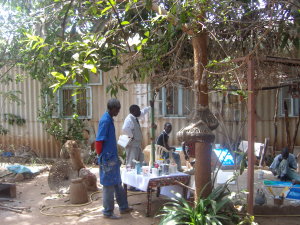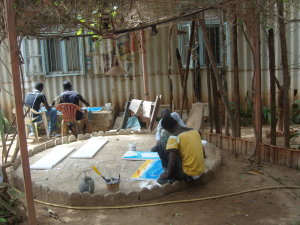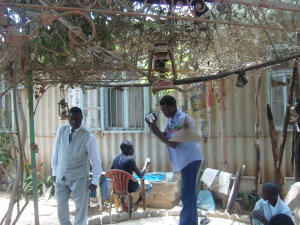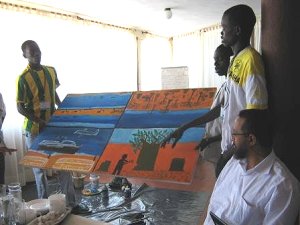Make the most of scientific knowledge in schools and promote the expression of young people on the marine environment
For interactive dynamics beween researchers and highschool students for sustainable seas through the eyes of art – a dream comes true.
 A workshop on climate change and its probable effects on the environment as well as the additional risks this may pose for coastal communities and others already suffering from the effects of long-standing overfishing, was convened at the Hôtel Océan in Dakar, Senegal, from 14 to 16 April 2010. One of the objectives of the organisers was to propose, at the end of the workshop, some scenarios of coastal management for the horizon 2050. Click here to see the invitation posters (event) - (youth programme).
A workshop on climate change and its probable effects on the environment as well as the additional risks this may pose for coastal communities and others already suffering from the effects of long-standing overfishing, was convened at the Hôtel Océan in Dakar, Senegal, from 14 to 16 April 2010. One of the objectives of the organisers was to propose, at the end of the workshop, some scenarios of coastal management for the horizon 2050. Click here to see the invitation posters (event) - (youth programme).
The WorldFish Center, headquartered in Malaysia, had contacted Mundus maris to explore what type of contribution we could make to the gathering, which brought together mostly researchers and managers with backgrounds in fisheries resources management and conservation, including in marine protected areas.
This request was the result of appreciation of the vision and objectives of Mundus maris by the WorldFish Center since a regular contact had been established in the occasion of the last MARE Conference in Amsterdam in July 2009.
In this occasion, Mundus maris had provided the opportunity to European (Belgium, Germany), West African (Nigeria and Senegal) and Maghrebian (Morocco) highschool students to present their work on how we relate more sustainably with the sea, the threats arising for the sea and the people of the sea from overexploitation of marine resources, but also on the beauty of the sea and of marine life. These works were exposed at the University of Amsterdam where the conference was held. For more information click here.
 Other similar activities were also conducted by our international initiative. These activities want to be innovative by opening alternative and complementary space for 'international conversations' and solidarity to allow the young people
Other similar activities were also conducted by our international initiative. These activities want to be innovative by opening alternative and complementary space for 'international conversations' and solidarity to allow the young people
-
to meet their peers living in other countries and circumstances;
-
to measure up with the results of scientific research;
-
to explore, including through artistic means, the 'digestion' of these scientific results compared to their perceptions of daily surroundings and their aspirations for the future;
-
to take steps for extending international cooperation on the concrete issues of saving the seas and promoting sustainable life styles.
We had thus proposed to the WorldFish Center to base our participation on the mobilisation of four students from the secondary school in Kayar to participate in this workshop in order to express their expectations for the future through their paintings.
Some of the paintings represent the on-going nightmare of flooding since the last winter period, which, according to some experts are already the precursors of climate change or at least indicative of growing instability of weather patterns. The other paintings addressed naturally fisheries and marine topics.
The specificity of this initiative, conducted by Aliou Sall of Mundus maris for the Dakar workshop, is connected to the following three aspects:
-
 this time round, the accompoanied students were based in the arts village in Dakar to develop their paintings; one part were individual works and the other group works by two students each to promote collaboration - the pictures capture different moments of the students' work under the supervision of the artist Samba Laye Diop (in the blue work coat above) and accompanied by another artist (with camera to the right) and the principal of the CEM Kayar, Abibou Diop (to the right);
this time round, the accompoanied students were based in the arts village in Dakar to develop their paintings; one part were individual works and the other group works by two students each to promote collaboration - the pictures capture different moments of the students' work under the supervision of the artist Samba Laye Diop (in the blue work coat above) and accompanied by another artist (with camera to the right) and the principal of the CEM Kayar, Abibou Diop (to the right); -
during the expert meetings, the students realised a collective fresco in the same room where the plenary took place;
-
all works were on display in the conference hall itself during the entire duration of the workshop and arrangements had been made to allow the expert delegations from abroad, one by one, to take a careful look at the students' works and get their explanations (see photo below courtesy Marie Caroline Badjeck, other photos courtesy Aliou Sall).
-
The delegations of experts were from Ghana, Mauritania, Senegal, Germany and Tanzania. The workshop organisers were the WorldFish Center (Malaysia), GTZ et ZMT (Germany), IDRC (Canada) and Quest-Fish, (United Kingdom) supported locally by Mundus maris.

A real interaction has taken place between the students and the researchers on questions relating to the threats to the oceans. This interaction was particularly visible during the Dakar workshop when (a) the whole group went to the arts village with the experts from the five above-mentioned countries, the organisers, the representative of Mundus maris, the students and their director; (b) the participation of the students in some parts of the workshop where they took advantage of the English simultaneous interpretation, given that they themselves were French speakers.
For more information, contact This email address is being protected from spambots. You need JavaScript enabled to view it..
The World Fish Center put out a press release following the workshop, in which the main results are summarised and the contributions of Mundus maris and the young people from the Kayar fishing village are acknowledged.
For a summary of the workshop report read on.
Envisioning 2050: Climate Change, Aquaculture and Fisheries in West Africa
Dakar, Senegal 14-16th April 2010
 This report presents the activities and results of the workshop "Envisioning 2050: Climate Change, Aquaculture and Fisheries in West Africa". The objectives of the workshop were to discuss critical issues and uncertainties faced by the fisheries and aquaculture sector in Ghana, Senegal and Mauritania, build sectoral scenarios for 2050 and discuss the implication of these scenarios in the context of climate change for the countries and the region. During the workshop participants were introduced to scenariobuilding methodologies, identified drivers of change and ranked them according to their importance and levels of uncertainty. Participants then constructed four consistent scenarios for 2050 for each country.
This report presents the activities and results of the workshop "Envisioning 2050: Climate Change, Aquaculture and Fisheries in West Africa". The objectives of the workshop were to discuss critical issues and uncertainties faced by the fisheries and aquaculture sector in Ghana, Senegal and Mauritania, build sectoral scenarios for 2050 and discuss the implication of these scenarios in the context of climate change for the countries and the region. During the workshop participants were introduced to scenariobuilding methodologies, identified drivers of change and ranked them according to their importance and levels of uncertainty. Participants then constructed four consistent scenarios for 2050 for each country.
The scenarios raised several questions including: Can aquaculture address both national food security and macroeconomic growth? Should regional trade be promoted or access to global markets prioritised? How will climate change affect fishery resources, especially small pelagic fish like sardines, which are an important export commodity for Senegal and Mauritania?
Participants also assessed the implications of the different scenarios in terms of climate change and research and development in the fisheries and aquaculture sector. It was agreed that a regional or sub-regional effort is needed to better integrate scientific knowledge and to put into place coherent fisheries policies. Additionally, a better understanding of the impacts of climate change on the sector is needed, with for instance, the development of coupled climate-fisheries models for major commercial fisheries in the region. Participants unanimously agreed that strategic planning and foresight studies methodologies should be widely disseminated. Indeed the opportunity for reflective and creative thinking was recognised as an important part of planning - especially adaptation planning - to climate change.
Finally, the workshop provided a rare opportunity to include in a foresight study, art projects by youth on the future of the fisheries sector and the coasts as an exhibition and discussion theme (“Visions of the Future: What is African Youth telling us about our Ocean?”). Empowering youth on climate change issues and integrating their needs into adaptation planning is essential as they will be the ones most affected by future developments.
The workshop report can be downloaded here.








